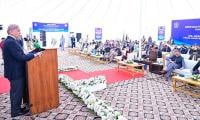NEW DELHI: Pakistani teenager Afsheen Gul suffered from a rare condition that kept her neck at 90 degrees. She struggled to access the right treatment until her case was brought to a doctor in India.
For most children, it's their classmates at school or neighbours they grew up with who became their friends.
Sometimes, it's their favourite stuffed toy or perhaps even a pet. But for 13-year-old Afsheen Gul from Sindh province, life had been a little different. The youngest of seven siblings, she never went to school or played with her friends.
That's because an accident - she fell from her sister's arm when she was just 10 months old - left her neck bent at 90 degrees. Her parents took her to the doctor who gave her some medicines and put a belt around her neck for support, but her condition only worsened.
"She could not walk, eat or talk. She used to just lie on the ground and we used to help her with everything," Afsheen's mother Jamilan Bibi recalls, adding that they could not afford further treatment.
For 12 years, Afsheen spent her life confined to her house in Mithi, nearly 300-km from Karachi, in this painful condition. However, her life changed in March when an Indian doctor successfully operated upon her curved neck. Dr Rajagopalan Krishnan, a specialist of complex spinal surgeries at the Apollo Hospital in Delhi, offered to do Afsheen's surgery free of charge.
Four months on, Afsheen can finally walk, talk and eat on her own. The wounds of her surgery have healed. Dr Krishnan checks on her via Skype every week. "She is a little weak - and is still unable to go to school - but the doctor says that will get better with time," Afsheen's brother Yaqoob Kumbar says.
"We are so happy - the doctor saved my sister's life. For us he is an angel," Mr Kumbar says.
Her condition gained worldwide attention in 2017, when an article on a news website spotlighted her story.
Pakistani actor Ahsan Khan shared a photo of Afsheen on Facebook, urging people to help, while Afsheen's mother was invited to a popular morning show hosted by Sanam Baloch.
In November 2017, Naz Baloch, an MP from the ruling Pakistan People's Party (PPP), tweeted that the Sindh government would provide complete treatment to Afsheen.
She was hospitalised in Agha Khan University Hospital in Karachi in February 2018, where specialists said they would operate on her, but gave her a "50% chance of survival", Kumbar says.
Afsheen's parents asked the doctors for time to think over it and took her home. "But we got busy with my sister's wedding and her treatment could not be completed," her brother says.
Kumbar adds that after the wedding, the family contacted government officials to resume Afsheen's treatment but were allegedly disappointed when they did not receive a positive response.
Afsheen was back in the news in 2019 when a British journalist, Alexandria Thomas, reported on her condition and her family's financial position. Ms Thomas also put the family in touch with Dr Krishnan in Delhi, who spoke to Mr Kumbar and told him that he was willing to help Afsheen.
The family applied for visa on medical grounds and arrived in India in November last year. An independent childcare organisation, Darul Sukoon, helped them with the process. It was an extremely difficult time for Afsheen and her family, Mr Kumbar recalls: "Dr Krishnan told us that her heart or lungs may stop beating during the operation." There were also financial troubles - Afsheen's family did not have the money to pay for her treatment. So they relied on the online fundraiser to meet the expenses.
But Dr Krishnan gave the family hope. Kumbar says he had been in contact with several doctors during this period, but no one as "sensitive and kind " as him.
"Due to his efforts and supervision the operation was successful," he adds.
Afsheen underwent two major surgeries before the main neck surgery, which was followed by another major operation.
The main surgery took place in February. Dr Krishan said that he and his team attached Afsheen's skull to her spinal cord during a six-hour operation.
The skull was then attached to the cervical spine using a stick and screws to keep the neck straight.
After the surgery was successful, Dr Krishnan told reporters that Afsheen would not have lived for long without treatment.







